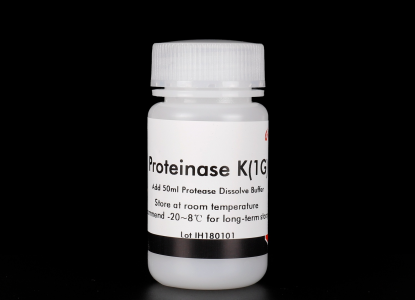Introduction
Proteinase K is a stable serine protease with broad substrate specificity. It degrades many proteins in the native state even in the presence of detergents. It is not activated by metalions, chelating agents (for example, EDTA), sulfhydryl reagents, or by tripsinor chymotrypsin inhibitors. It is stable over a wide pH range (4-12.5), with optimal activity at pH 6.5–9.5. Activity can be stimulated by addition of denaturing agents (SDS and Urea). Rapid denaturation of the enzyme occurs at temperature above 70°C. Autolysis of the enzyme occurs increasingly at alkaline pH. However, Proteinase K is not completely inactivated by autolysis. Some enzyme fragments continue to maintain their complete proteolytic activity, even after extensive autolysis.
Proteinase K is frequently used in molecular biology applications to digest unwanted proteins, such as nucleases in DNA or RNA preparations from microorganisms, cultured cells, and plants. The enzyme is typically used at 50–200 μg/ml in nucleic acid preparations at pH 7.5-8.0 and 37-55°C. Incubation times vary from 30 minutes to 18 hours.



